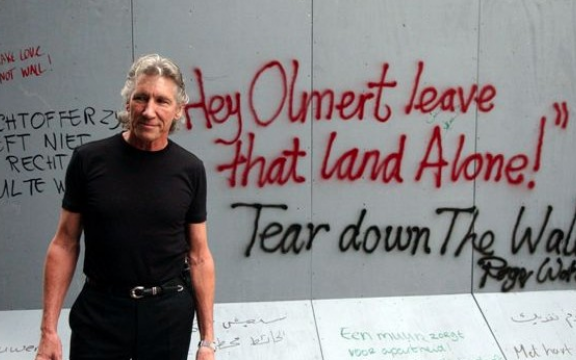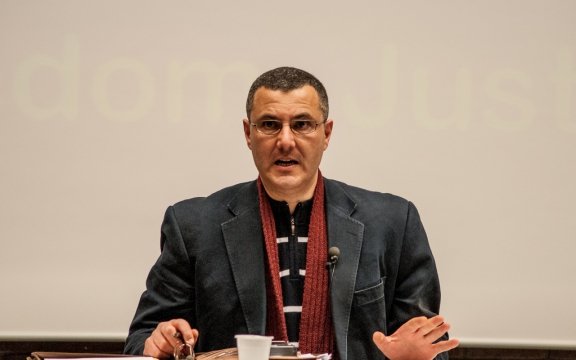The most hidden stories of 2017 #2: the BDS campaign

Too many vital stories remained under the radar. They should be on the front page every week, but they hardly ever get a column in the back of the paper. This has to do with power and how media works these days. I want to bring up these stories, with a positive and a negative story each time. In this episode: the BDS campaign. Feel free to resteem these stories if you think they are important.
The BDS movement is continuing to forge ahead
The news came as a shock to her fans in Israel. Not only did the New Zealand singer Lorde canceled her concert, she added in an unmistakable statement that planning the concert was already wrong. "I’m not too proud to admit I didn’t make the right call on this one.” An open letter from two New Zealand women, the Jewish Justine Sachs and the Palestinian Nadia Abu-Shanab, was the deciding factor for Lorde.
There are already a lot of popular music artists who have canceled concerts or have decided never to perform in Israel, but that are established artists, of which Roger Waters, founder and leader of Pink Floyd, is one of the most pronounced.

Elvis Costello, Gill Scott-Heron (deceased), Lauryn Hill, Faithless, Marianah, Bjork, Zakir Hussain, Jean-Luc Godard, Cat Power and Vanessa Paradis have also spoken out about this issue.
However, Lorde is the first young singer with an exclusive young (and very large) audience that takes this step. Israeli author and artist Yuval Ben-Ami confirms that: "(Her decision) is paramount to the BDS movement’s influence on a new generation of performers. Several other great artists have canceled, but she appears to be the first of her generation, and that’s meaningful.”
Outwardly, the government in Israel keeps up appearances, but in an internal (and secret) report, they admit that, despite a huge financial effort of tens of millions of dollars (and the establishment of a separate ministerial department) they do not succeed to block the solidarity movement for Palestine. The report talks about "impressive growth" of BDS and "significant successes".
BDS continues to influence public opinion
Opinion polls in Great Britain, Canada and the US, where governments are the largest and most powerful foreign allies of the current regime in Israel, show growing support for the BDS movement. In the US itself, unconditional support for Israel is still the highest in the world (outside Israel itself, but there is also a downward trend). This growing support is also shown by a growing number of BDS initiatives.
The Democratic Party of the State of California approved a resolution condemning the construction of colonial settlements in the occupied territories and disapproving the ban on foreign activists on the ground.
A British court condemned the conservative government of Theresa May because it attempted to ban local authorities to stop their investments in occupation-linked companies.
Twice the Israeli propaganda attempted to brand Labor chairman Jeremy Corbyn as anti-Semitic. The major media such as the public broadcaster BBC and The Guardian were fully involved. That ultimately failed over the whole line, which in turn received hardly any attention in the same media.
The British union NUT (National Union of Teachers) launched a boycott of the American company HP (Hewlett-Packard). The NUT urged schools to stop buying computers from HP because the company is supplying technology to the Israeli occupation army and declared all of its offices to be 'HP-free zones'.
UN report condemns ‘apartheid’ in Israel
In March 2017, the UN published a report that condemned Israel for the crime of ‘apartheid’. According to Omar Barghouti, co-founder of BDS, this means that "our South Africa moment is approaching".

The UN report, the failed attempts to criminalize BDS as anti-Semitism and the recent cancellation of Lorde are just the more mediatised victories the movement achieved in 2017. Less media attention (or denigrating commentary) was there for the following victories:
In February, professional players from an American football team refused to participate in a propaganda tour for this sport in Israel. In July, film directors, actors and presenters gave up their cooperation with TLVFest. Allegedly, this film festival wants to defend the rights of other sexual minorities. Israel is attempting to defend its own country with similar promo campaigns as a free haven of progressive leftist ideas in a surrounding sea of hatred and terror.
Belgian filmmaker Jan Beddegenoots has canceled his collaboration for the same reasons at a film festival in the Slovakian capital Bratislava, because it is sponsored by the Israeli embassy.
After the summer of 2017, several international chefs stepped out of an Israeli initiative to promote the international character of Israeli cuisine.
The American department of the writers' organization PEN has declared that it no longer accepts sponsorship from the Israeli government for its annual World Voices Festival, after more than 250 well-known writers, poets and publishers had called for a stop.
In Norway, one of the largest trade unions has called for a full boycott of Israel.
In the US, the leadership of the Mennonites also launched a call to defend the human rights of the Palestinian population. In their annual convention in Florida, they condemned the occupation and disapproving investments in companies that benefit from the occupation.
The Mennonites are a small Protestant church community with about 80,000 followers. However, a month after their call they were followed by ‘the Reformed Churches’, who took over their initiative. Worldwide, around 80 million people are members of one of the reformed Protestant churches of this organization.
Increasing student protest
In 2017, the G4S security company, the largest of its kind in the world, suffered heavy financial losses because it was branded as a contributor to serious violations of human rights in the occupied territories. G4S helped the Israeli government to control their prisons, where Palestinian prisoners are routinely tortured, and where Palestinian children are detained and abused. An Ecudaorian research institute terminated its contract with G4S. The UN Women branch in Jordan did the same, as did the transport department of Sacramento in California. In order to avoid an escalation of cancellations, G4S decided in 2017 to cancel its cooperation with the Israeli government.
In the US, student associations have issued resolutions and organized activities to promote BDS. This happens at the Tufts University in Boston, the University of Michigan and the Long Beach branch of the California State University.
Students at the University of Wisconsin placed BDS in a broader context by combining the violation of Palestinian human rights with protest against the cooperation of companies to their own American prison system, against stealing land from the American indigenous peoples and violations of their human rights, against the construction of the wall on the border with Mexico, against police brutality in general and in particular against minorities and against the economic injustices committed against non-white fellow men in the US and abroad.
In the US, several anti-BDS laws were seen as unconstitutional by the courts, thanks to the human rights organization American Civil Liberties Union. Both at federal level and in several states such as Kansas and Arizona. In Oregon, an anti-BDS bill could be deleted before it was discussed in the state parliament, thanks to the actions of activists.
In Belgium, KU Leuven has decided not to extend cooperation on a research project with the EU, because the Israeli police are also cooperating on this.
International pressure remains necessary
These successes are an important support for the Palestinian resistance in the occupied territories. The struggle, however, is far from being fought. Israeli journalist Gideon Levy emphasizes the importance of this international solidarity. According to him, real change will only come under international pressure.

The victories summarized here demonstrate several things: firstly, the mainstream media are no longer able to frame their unilateral 'neutral' discourse within a direction favorable to Israel, and secondly there is the increasing influence of internet activism. Thirdly there is the realization that much more will be needed to bring real peace and justice for Palestine.
These victories are inspiring, but in no way can they be considered as definitively acquired. After all, Israel still has very powerful allies with the political elite of the US and the EU and has great economic interests in the EU and the US. That was also the case in South Africa. The resistance against the ‘apartheid’ has also been in this situation for years: great support from public opinion, continued support to the regime in governmental and economic circles. In the end, the apartheid system did collapse, much faster and more suddenly than observers had predicted.
That is the main lesson that BDS activists must draw from the past: act as if you will be working for years, but be ready for the change that can come tomorrow ...
Sources:
- https://electronicintifada.net/blogs/nora-barrows-friedman/lorde-cancels-tel-aviv-show-calls-it-right-decision
- https://thespinoff.co.nz/politics/21-12-2017/dear-lorde-heres-why-were-urging-you-not-to-play-israel/
- http://www.dewereldmorgen.be/artikel/2017/09/01/vn-rapporteur-richard-falk-israel-is-een-apartheidsregime
- https://electronicintifada.net/blogs/nora-barrows-friedman/what-were-top-bds-victories-2017
- YouTube screenshot
- pinkfloyd.eu